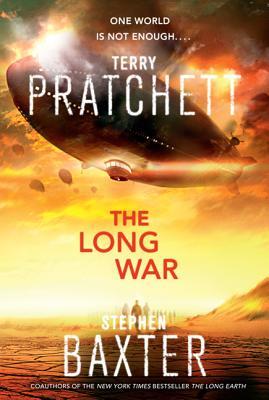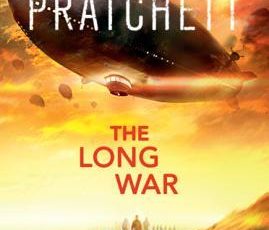This review was originally posted on Goodreads.com and reviews.wheelerc.org on March 17, 2015.
The sequel (in a planned series) to The Long Earth is a disjointed, unbelievable and internal-morality questionable series of vignettes, too many characters and, worst of all, no actual plot.
Please, don’t get me wrong. I love Terry Pratchett’s books, to a fault, and I feel sacrilegious writing this review after his early death.
The Long War is, however, an un-plotted bore that breaks the suspension of disbelief and has an uneven moral grounding.
First, the plot. The Long Earth was enjoyable enough. At the end, there was a great force, the First Person Singular, that everyone had to watch out for. The foundations of the universe(s) the authors set down were enough to hang the book on. Enough happened. It was a nice jaunt.
 The Long War, however, has no antagonists, doesn’t have any protagonists and what is played up to be the rising action leading to the denouement is an entirely nonsensical confrontation that makes even less sense in light of the prologue.
The Long War, however, has no antagonists, doesn’t have any protagonists and what is played up to be the rising action leading to the denouement is an entirely nonsensical confrontation that makes even less sense in light of the prologue.
Plus, the real villain/antagonist, the First Person Singular, is neither dealt with nor heard from.
Onward to the slipshod morality: I’m all for anti-heroes and no morality and no scruples and the whole ball of wax. Love it! But, a book needs to be consistent and that is something that The Long
War is not.
The characters, and seemingly the authors, create a cognitive dissonance in their handling of the various sentient species dealt with throughout the novel.
The not-particularly-sentient species, the Trolls, which thrive through a collective consciousness, are portrayed, and treated throughout the book by other characters, as nothing short of short-bus angels.
The Kobolds on the other hand, considered to be a subset of the Elves (Trolls are nice, and there appears to only be one species of them and the Elves are not nice and there appears to be many species of them) and are just as smart as humans, but because they barter across the worlds, they’re actually bad. Not evil, no, just bad. Like the Ferengi in Star Trek or the Jews in Europe up until modern times.
None of the characters have this cognitive dissonance they create challenged, the unequal treatment of sentient species, based mostly on the idea that trade is bad.
All in all, it was a boring slog with far too many characters that never did anything.
And the end! Rising action, followed by, prologue, 10 years in the future. Boring. Boring. Boring. And lazy.
